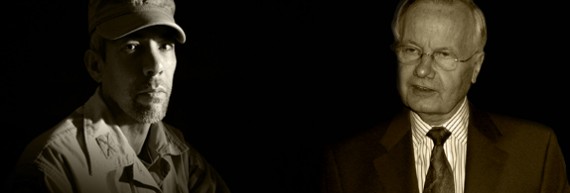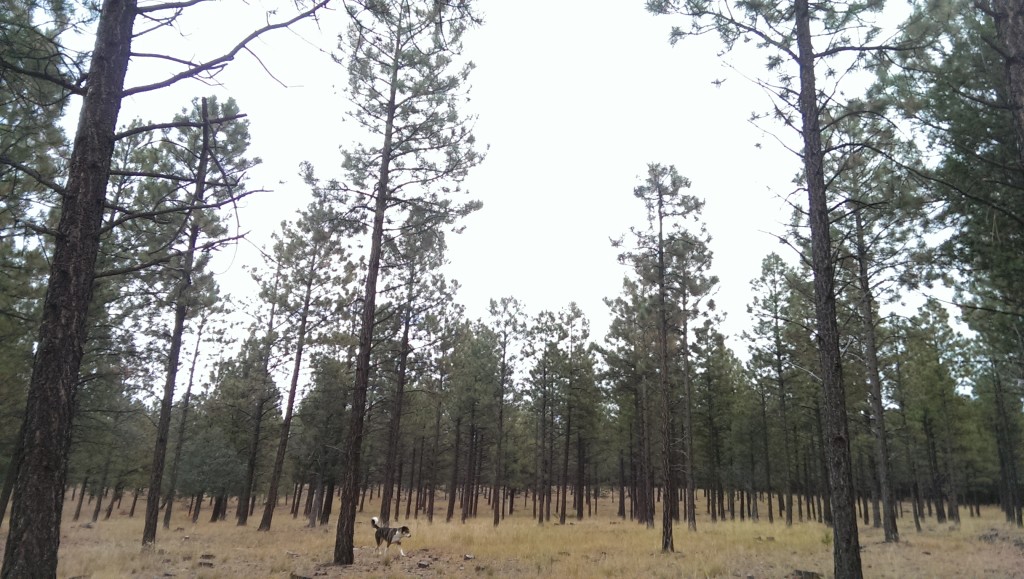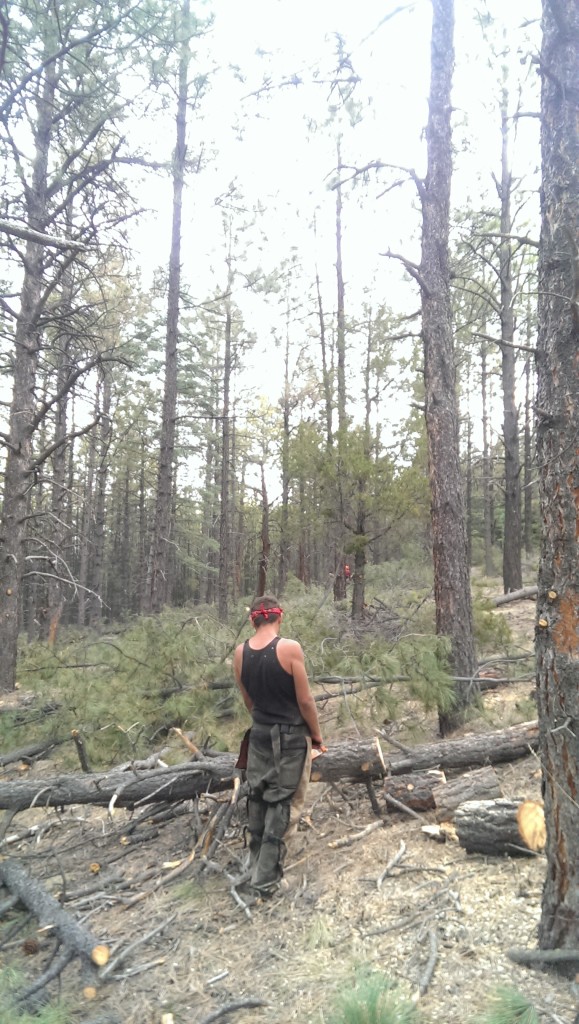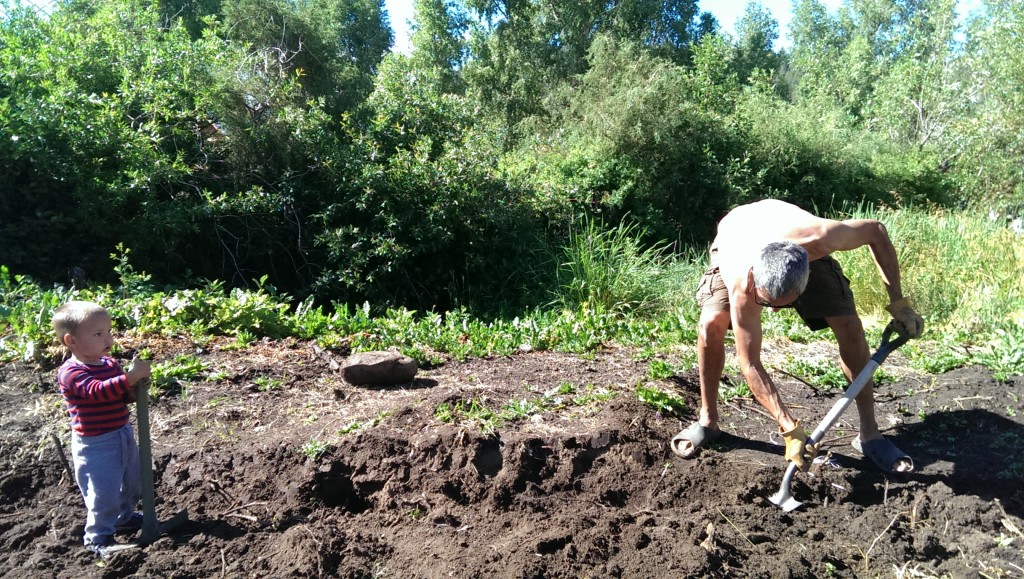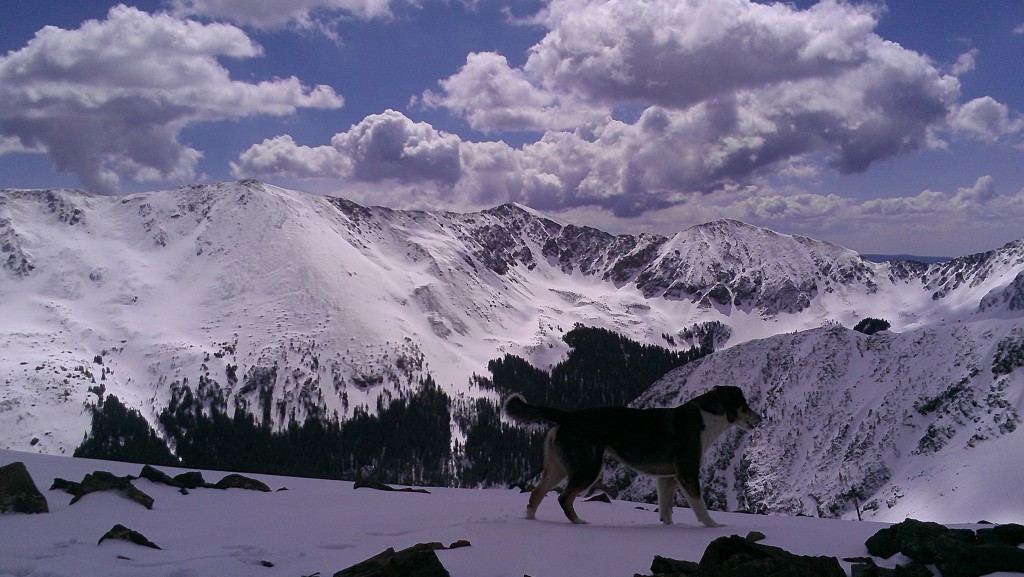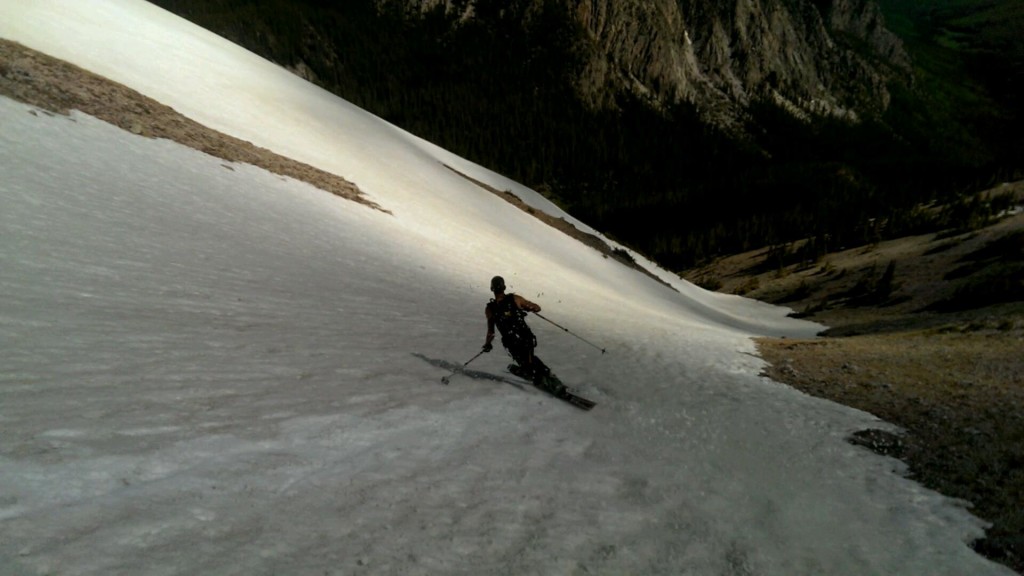Editor’s Note: Iraq veteran Tele Mon continues his projected conversation with Bill Moyers, touching on forest restoration, the call to raise the minimum age of enlistment, and telemark skiing. His initial interview with Moyers, in which he talked about pets in war, moral injury, and the police state, can be read here.
Moyers: Welcome. Today we are pleased to be joined by 15-year Army veteran, poet, and environmental and social activist, Tele Mon. Welcome back to the program, Mr. Mon.
Mon: Thank you, Bill. It’s good to be here.
Moyers: Talk to me about the forest restoration work you’re doing.
Mon: Where I live in northern New Mexico, I have a neighbor who is devoted to forest restoration. He’s been systematically thinning and managing the forest in his care for the last several years, restoring it to health. We had a conversation about it, I toured an area that he had restored behind his house, and something just clicked.
Moyers: Tell me. Why does the forest have to be restored, and what forest are we talking about?
Mon: We’re talking about the Ponderosa pine forest of the American Southwest. Most people think the forests have always looked pretty much like they do today. Nothing could be further from the truth. With regard to the Ponderosa pine forest, heavy grazing, logging, and fire exclusion have led to a completely unnatural and unhealthy forest. There’s many more younger and smaller trees, fewer older and larger trees, accumulation of heavy forest floor fuel loads, and virtually no understory. That would be the grasses that feed the elk and deer and such. So the forest, the current state of the Ponderosa forest, is grim.
Moyers: What’s the biggest concern?
Mon: The biggest concern, the biggest danger, is catastrophic fire. With the forest in such an unnatural state, with such an overabundance of fuel, fires burn out of control quickly, and at such a temperature that nothing can survive.
Moyers: And the Forest Service is aware of this?
Mon: Oh, very much so. Just the other day I was at a meeting for my local forest, the Carson, they’re developing a new forest management plan since the plan they’ve been working off of is nearly 30 years old, so they’re in the process of soliciting public input. At the presentation, the first thing they talked about was the unnaturally dense and thick state of the forest, and the need for comprehensive thinning. The problem is that they don’t know how to get it done on a large scale, and they probably don’t have the money. Anyway, my suggestion to them was to check in with veteran groups and propose a national effort by veterans to do this restoration work.
Moyers: You think this would be good work for veterans. Why?
Mon: Well, for one, many of us qualify as wards of the State, so we have some means of support other than the 10 to 12 dollars an hour this work pays. Second of all, it would be an epic undertaking. We’re talking about hundreds of thousands of acres of public forest that need this work done. Veterans relate to the feeling of being part of something big. A small army would be needed for this work. Third, the work is hard and dangerous. Thinning operations involve backbreaking labor and dangerous work conditions. You’re running chainsaws, trees are dropping around you. If you’re burning the slash it can be not only loud but smoky. It can feel apocalyptic at times. Veterans are familiar with this state of chaos and disorder. Third, the work is done by small teams working at close quarters under difficult conditions, again something veterans understand and often miss after returning home–the camaraderie, the sense of team, the sense of a shared mission. And finally, it’s restoration. How many veterans out there are struggling to restore themselves? Struggling to put themselves back together? Restore their moral compass? To be part of an operation with such an obvious and meaningful end state, a healthy forest, a forest that promotes life, a forest that projects life, a forest that helps insulate and shield us from the effects of global warming, that is a powerful and cathartic undertaking.
Moyers: And you speak from experience.
Mon: Certainly. The forest restoration I am doing is deeply meaningful to me.
Moyers: In addition to the forest restoration work, you’ve also been working on raising the minimum age of enlistment in the Armed Forces to 25. I should mention that it’s currently 18.
Mon: Actually, it’s 17. You can sign up and join under the Delayed Entry Program at 17, which is what happened with me.
Moyers: What justification could you possibly have for preventing so many young people from joining the military at their earliest opportunity? After all, that’s the age that we as a society say a child is an adult, able to make their own decisions.
Mon: How about basic human decency, Bill? You think it makes sense that we don’t trust young people, we don’t trust their judgment enough to permit them to drink a beer until they’re 21, but we enable them to make a decision to commit themselves to becoming killers, to risking their lives, to dying some horrible death, at the age of 18? Even if the justification for war were legitimate, adult society should not be sending teenagers to die. I don’t think it’s right. Plus, as teenagers, we are way too susceptible to indoctrination and brainwashing, we’re too vulnerable to strong influences.
Moyers: The point about the legal age of drinking is a good one, but how do you get to 25?
Mon: Numerous studies show that the brain of a young male is not fully formed, that he does not possess sound reasoning abilities, that his judgment is compromised, significantly compromised, until he is about 25, when his frontal lobe matures. Look at the frequency of emergency room visits for young males. Far exceeding all other segments of the population. They simply are not developmentally mature enough to make that sort of decision. There’s a reason why car rental companies ask if you’re over the age of 25 and impose a surcharge if you’re not.
Moyers: You mentioned indoctrination and brainwashing. I want to return to that. Do you feel like you’ve been brainwashed by the military?
Mon: Absolutely. Bill, do you have any idea the frequency during bootcamp, basic training, that I had to repeat, in unison with all my fellow recruits, “I want to kill.” Every time we sat down, every time we took a seat, for a class, for a briefing, for any gathering as a group, we would be ordered to take a deep breath. Deep breath, deep breath, they would say. Suck it in, they would tell us. Then, when they told us to let it out, we would be holding our breath during this time, right, we would all, in unison, not yell, not yell, we would whisper, all whisper, hoarsely, just like this, “I wanna kill.” It was eerie, Bill. Scary. And it was effective. Everyday, Bill. That sort of indoctrination turned me into an unquestioning mindless killer. You could have ordered me to kill a kitten with my bare hands and I wouldn’t have hesitated. Whatever. Look, Bill. I don’t want my sons, I have two sons, I don’t want them to even have the option to go through something like that at 18.
Moyers: But you were in training to be a soldier. You were training to shove a bayonet into a man’s stomach. You were training to disembowel people. Maybe that is an effective way to get you to become a better soldier, a better killer.
Mon: That’s right, Bill. I’m sure it is. And that is exactly what society has no business asking of our teens. We should not be molding them, at that age, to be mindless killers.
Moyers: It seems like you’re not complaining so much about the indoctrination as you are about the age at which we start the indoctrination?
Mon: We actually start much younger than that. Look at the Pledge of Allegiance. The daily Pledge of Allegiance that we exact of our children. I was spouting that off robotically before I even knew what the words meant. That isn’t right. I was already being conditioned, at that age, to a lifetime of unquestioning obedience and conformity.
Moyers: You’re opposed to the social order.
Mon: Without a doubt. If you’re not opposed to the social order…um…I would like to know what planet you’re living on. Let me tell you something, Bill. We don’t have to get into all the things wrong with society. I mean the list goes on and on. But without a doubt the problems posed by a world that favors the quarterly returns of transnational corporations over the needs and rights of everyday citizens to clean air and water and a healthy environment? That is a sickness. This unrelenting quest for profit at all costs is something the transnationals cannot self-police. They will never stop and desist on their own. This would be like expecting slave owners, on their own, to come to the realization that slavery is an abomination. No, never going to happen. The slave owners of this country were, given the standards of the times, good, law abiding folk. They were religious. They would quote scripture even as they whipped their slaves. The point is that the status quo protects itself at all costs. It is incapable of imagining the scope of its depravity, the extent to which it is violating basic human rights, the extent to which it is denuding and destroying the planet. The collective march to the brink, the diminishment of our world, this is something that will not stop without outside intervention, intervention from outside the social order.
Moyers: You’ve said in one of your essays, “When the first shots of the revolution are fired, I won’t be carrying a gun, but I’m not above carrying a pitchfork.”
Mon: That’s right. Pitchforks, rakes, hoes, keep all your garden tools close. (Chuckles.)
Moyers: You believe that the revolution has already started?
Mon: I have to, Bill. I have to believe it. It is one of the few beliefs that keeps me going. I fervently believe that the revolution has already started. I fervently believe that people, young people especially, can see that the clock is running out, and I believe there are sufficient numbers of courageous people willing to practice civil disobedience, to defy the social order, defy the status quo, and bring about real change.
Moyers: If you were being monitored by national security agencies, Homeland Security, for instance, would you be surprised?
Mon: The most dangerous group of people as far as the status quo is concerned, as far as I’m concerned, are the ones with the scars, the disillusioned ones, those that have returned from an illegal and imperial war with the taste of poison and betrayal in their mouths. The ones that have taken their scars to ground, that have become planters and farmers, that have plunged their hands into the black soil, that have cradled babies, that have settled by streams and rivers, that have reconnected themselves to the sanctity of life. These are the ones that carry within them the ability to rise up, aware, supernaturally aware, that within them is the strength, the resolve, and, most importantly, the obligation, to protect life, good decent wholesome quality life, all forms of life, on this planet.
Moyers: We’re going to move on to something else that’s close to you. Tell us about telemark. Free heel skiing.
Mon: Whew, that’s better. Okay, I spend a good portion of my life out of the range of cell phone towers. I live close to a broad expanse of wilderness for a reason. I go into the woods, into the mountains, regularly, for solace, peace, to calm myself. Being surrounded by wilderness is a form of medication and meditation for me. In the summer months I’m able to walk. In the winter months I travel on skis. Telemark skiing has become a great way to get out and about no matter the conditions.
Moyers: How did you first discover telemark?
Mon: I was involved in a bad accident about 6 years ago. At that point I had been diagnosed with PTSD but had not yet developed coping strategies. I was engaged in high-risk behavior, inappropriate behavior, compulsive and dangerous behavior, drugs, alcohol, on and on, and on this particular day I was traveling at a speed which left no room for error… and…um…yeah…
Moyers: What were the extent of your injuries?
Mon: I was pretty well broken in half. Had to be medevaced. Was in the ICU for two weeks, underwent 3 surgeries, hospitalized for another 3 weeks after that. Couldn’t walk for six months. Fractured sternum, fractured pelvis, broken back, shattered lower extremity, tibia and fibia, ruptured bladder. Doctor suggested I look into exercise to improve the range of motion in my ankle. That’s how I found telemark.
Moyers: You’re actually working on starting a foundation, “Telemark for Veterans.” This wouldn’t be just for veterans that need ankle rehabilitation, right?
Mundo: Haha, the funny thing is that telemark was initially just a way to get my ankle back, but it has become so much more. You have to be very centered to telemark. You have to constantly be refining your balance, always striving to remain within this narrow band of acceptable balance. You can’t be anywhere but in the present moment, absolutely attentive, absolutely focused, and this, for someone who is struggling with bad memories or bad thoughts, is like a window, a portal, into good feelings, into positive feelings. Because anything other than the bad feelings, anything other than the grief, or sadness, or depression, is going to be a preferable and healthier state. That substitute feeling can over time grow into a true feeling of stoke. Way better than any of the drugs we’re getting. Add to this the fact that you can do this in the mountains in just the most sublime state of physical and natural beauty, and this becomes something really worth living for.
Moyers: And this becomes important when an average of 22 veterans a day are committing suicide.
Mon: Absolutely. If I have found something so good that it is keeping me hopeful, keeping me resilient, keeping me optimistic, keeping me strong, mentally strong, then I want to share this with as many veterans as I can. I’ve reached out to a couple big mountain telemark skiers and I think we can, with some collaboration, with maybe the support of Outward Bound or the Sierra Club, get a week long course together by next winter.
Moyers: Well, we wish you the best of luck in that endeavor. We have just enough time for a poem, if you’d like to read something for us, would you?
Mon: I’d be happy to, Bill. This is a poem about skiing the mountains of New Mexico in June. It’s called “Ride.”
Ride winter’s
last wave of snow
down to the trees
and river below
and go barefoot
in summer’s
green meadow.
Moyers: That’s lovely. Short and to the point. Very nice. Thanks for joining us today, Tele.
Mon: Thank you, Bill.
Tele Mon served in Iraq with CTSO (Counter-Terror/Special Operations) under Colonel Ted Westhusing. He writes for the Alibi, New Mexico Compass, and blogs at WarriorsWithWesthusing.org. In 2012 he started the Rio Grande Bosque community Facebook page to draw attention to Mayor Berry’s plan to commercialize and develop the Bosque. Along with its sister website, SaveTheBosque.org, the page worked to help minimize habitat loss in the Bosque. Tele Mon makes his home in northern New Mexico.

